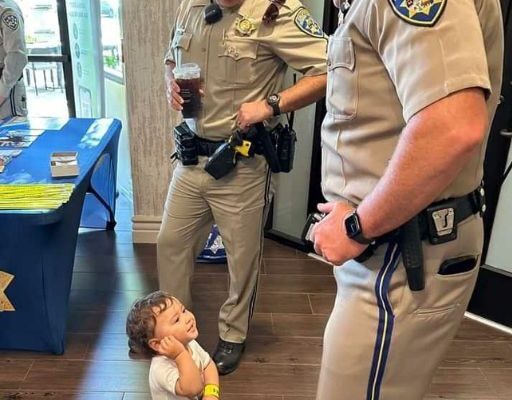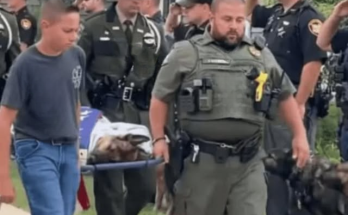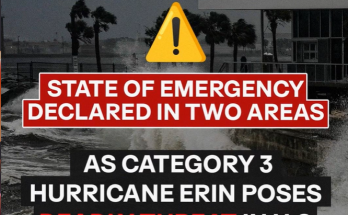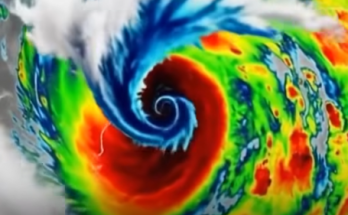We only planned to stop at the bank for five minutes. That was it—just a quick ATM withdrawal before heading home. I told my son to stay close while I handled the machine, but he was in one of his restless, curious moods. He wanted to know everything—why the ceiling fans spun so fast, how money “came out of the wall,” and whether the machine ever “ran out of dollars.” I was halfway through my transaction when I turned around and realized he was no longer by my side. My heart jumped. Then I spotted him, completely at ease, chatting animatedly with two California Highway Patrol officers near the front entrance, as though they were old friends.
At first, panic surged through me. I hurried forward, ready to apologize for my son bothering them, but before I could intervene, one of the officers crouched down to his level and handed him a shiny sticker badge. That simple gesture sealed an instant bond. My son puffed out his little chest like he’d just been sworn into the force. He started firing off questions—about their walkie-talkies, what the buttons did, and most hilariously, whether police officers “eat donuts or just save them for emergencies.”
The two men roared with laughter, their hearty voices echoing through the quiet bank lobby. For a moment, I just stood there, taking in the scene. Here were two strangers, men with serious jobs and long days, yet they were giving my son their full attention. It was rare, and it felt unexpectedly heartwarming.
When I finished at the ATM and approached, my instinct was still to apologize. But before I could speak, one officer, Garcia, turned to me with a warm smile. “Don’t worry, ma’am,” he said gently. “Your son is quite the character. He’s got a lot of questions for us. We’re just answering them as best we can.” His partner, Officer Thompson, added with a chuckle, “Trouble? Not at all. We need more kids like him. Keeps us on our toes.”
I laughed softly, though the knot in my stomach lingered. Watching my son so openly connect with these officers felt both strange and touching. He had moved on to bigger questions now, like “How do you stop bad guys from getting away?” The officers exchanged a glance, then Garcia crouched again, lowering his voice as though he were sharing a secret. “The most important part of our job,” he said, “is that we never give up. We keep trying until we get it right.”
The look on my son’s face was unforgettable—wide-eyed awe mixed with admiration. He had always said he wanted to be a police officer, though I’d brushed it off as a childhood phase. One week it was astronauts, the next firefighters. But something about the way these men treated him—seriously, with respect—seemed to light a spark inside him that felt different this time.
As we left the bank, my son tugged on my sleeve. “Mom,” he asked, his voice softer than usual, “do you think I could be a police officer when I grow up?” I stopped in my tracks, taken aback by the sincerity in his tone. He wasn’t joking, and he wasn’t just parroting a dream. He meant it. I bent down to his level and told him, “You can be anything you want to be. But it takes hard work. Being a police officer means being brave, caring about people, and making tough choices. If you’re willing to do that, then yes—you can be one.” His nod was serious, almost grown-up. In his eyes, I saw a new determination beginning to take root.
Life carried on, and I almost forgot about that moment until a few weeks later. One evening, he came home from school clutching a piece of paper. It was an assignment—an essay titled What I Want to Be When I Grow Up. He worked on it that night at the kitchen table, tongue sticking out in concentration as he carefully wrote each word. When he finished, he proudly read it aloud to me. “When I grow up, I want to be a police officer. I want to help people and make sure the bad guys don’t get away. I will work really hard and be brave like Officer Garcia and Officer Thompson. They are my heroes.”
My throat tightened as he spoke. What had been, for me, a casual moment in a bank lobby had clearly become something life-changing for him. A few days later, I received a phone call from his school principal, Mrs. Adams. She told me the local police department had read his essay during a visit to the school. Officers Garcia and Thompson remembered him immediately and were deeply touched by his words. They wanted to invite him to the station for a special day—part of a community outreach program.
When we arrived at the station the following week, I watched my son’s dreams come alive. He toured the facilities, sat in a patrol car, and even tried on a uniform far too big for him. But more than the fun, it was the way the officers treated him—with seriousness, encouragement, and respect—that made the biggest impact. They showed him that being a police officer wasn’t about the badge or the car. It was about responsibility, courage, and service to others.
As we prepared to leave, Officer Garcia handed my son a small envelope. “This is for you, son,” he said with a wink. Inside was a scholarship for a summer leadership camp sponsored by the department, designed for children who showed a passion for community and service. My son’s eyes lit up, and I could hardly hold back tears.
That’s when I realized the deeper lesson. It wasn’t just about police officers or career dreams. It was about how genuine curiosity, kindness, and pure-hearted enthusiasm can open doors we never expect. My son hadn’t been trying to impress anyone. He was simply being himself—curious, unfiltered, and full of life. And in return, life gave him a gift that could shape his future.
The world has a way of rewarding authenticity in the smallest, most surprising moments. For my son, it all started with five minutes at a bank, two kind officers, and the courage to ask questions most adults never would.



